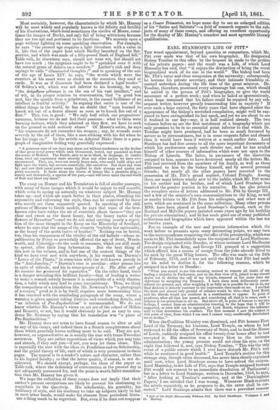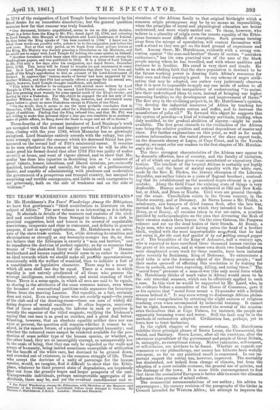EARL STANHOPE'S LIFE OF PITT.*
THE worst appointment, beyond question or comparison, which Mr. Pitt ever made was that of his own biographer. He designated Bishop Tomline to this office by the bequest he made to the prelate of his private papers : and the result was a 'Life, of which. Lord Macaulay has said, that "it enjoys the distinction of being the worst biographical work of its size in the world." The bishop had been Mr. Pitt's tutor and close companion at the university; subsequently he became his private secretary, and their intimate friendship re. mined unbroken during the life time of the great minister. Dr. Tomline, therefore, possessed every advantage but one, which should be united in the person of Pitt's biographer, to give the world assurance of a perfect work; and when he failed so ignominiously, what hope remained that his failure could be repaired by any sub- sequent writer, however greatly transcending him in capacity ? If ever such a hope existed, the forty years that have elapsed since the appearance of the bishop's wretched compilation, might well be sup- posed to have extinguished its last spark, and yet we are about to see it tealised in our day—nay, it is half realized already. The two volumes before us are the first instalment of a biography which not only promises to be in no essential point inferior to that which Dr.
Tomline might have produced, had lie been as much favoured by nature as by circumstances, but is in some respects fuller and clearer than it would have been if written at a much earlier date. Lord Stanhope has had free access to all the more important documents of which his predecessor made such slender use, and he has availed himself of other sources of information which were not open to the Bishop of Lincoln. The latter, in pursuance of the discretion assigned to him, appears to have destroyed nearly all the letters Mr. Pitt had received from the members of his family, as well as those addressed to him by the bishop himself, and by several personal friends ; but nearly all the other papers have reverted to the possession of Mr. Pitt's grand nephew, Colonel Pringle. Among them are many letters wholly new to the public, which Mr. Pitt wrote to his mother and his brother, and of which Lord Stanhope has inserted the greater portion in his narrative. He has also printed the complete series of letters addressed to Mr. Pitt by George III., and a few of the minister's own communications to the King, as well as sundry letters to Mr. Pitt from his colleagues, and other men of note, which are contained in the same collection. Many other private MSS. have been placed at Lord Stanhope's disposal, such as the Rutland and Melville papers (printed some years ago by his lordship for private circulation) ; and he has made good use of many published collections and biographies which have appeared within the last ten or twelve years. For an example of the new and precise information which the work before us presents upon many interesting points, we may turn to the correspondence respecting the offer of the premiership, whichwas made to Mr. Pitt immediately upon the resignation of Lord Shelburne. The design originated with hundas, at whose instance Lord Shelburne pressed it upon the King, and George ILI. grasped at a suggestion which offered him a means of escape from the yoke already fitted to his neck by the great Whig houses. The offer was made on the 24th of February, 1783, and it was not until the 27th that Pitt had made up his mind to decline it, for the following reasons, which he assigned in a letter to Dundas :
"What you stated to me this morning seemed to remove all doubt of my finding a majority in Parliament, and on the first view of it, joined to my sincere desire not to decline the call of my friends, removed at the same time my objections to accepting the Treasury. I have since most deliberately recon- sidered the ground, and, after weighing it as fully as is possible for me to do my final decision is directly contrary to the impression then made on me. I see that the main and almost only ground of reliance would be this—that Lord North and his friends would not continue in a combination to oppose. In point of prudence, after all that has passed, and considering all that is to come, such a reliance is too precarious to act on. But above all, in point of honour to my own feelings, I cannot form an administration trusting to the hope that it will be supported, or even will not be opposed, by Lord North, whatever the influence may be that determines his conduct. The first moment I saw the subject in this point of view, from which I am sure I cannot vary, unalterably determined me to decline."
When the Coalition Ministry was dismissed, and Pitt became First Lord of the Treasury, his kinsman, Lord Temple, on whom he had reckoned to fill the office of Secretary of State, and to lead the House of Lords, suddenly resigned his office twenty-four hours after he had accepted it. His desertion was a heavy blow to the inchoate administration; the young premier could not close his eyes on the night that followed it, and, says Bishop Tomline, "This was the only event of a public nature which I ever knew disturb Mr. Pitt's rest while he continued in good health." Lord Temple's motive for this strange step, though often discussed, has never been clearly explained until now, when Lord Stanhope seems to have solved the enigma. Lord Macaulay, in his Life of Pitt, says that Temple resigned because Pitt would not consent to an immediate dissolution of Parliament ; but in a letter to Lord Stanhope, written in December, 1858, he says, "After looking at Tomline's narrative, and at the 'Buckingham Papers,' I am satisfied that I was wrong. Whenever Black reprints the article separately, as he proposes to do, the error shall be cor- rected." Lord Stanhope admits that there was a prevalent rumour
* Life of the Bight Honourable William Pitt. By Earl Stanhope. Volumes II. Murray. L suid
in 1754 of the resignation of Lord Temple having been caused by his fixed desire for an immediate dissolution; but the general question remains how far that rumour was truly founded.
"One document, hitherto unpublished, seems to me on this point decisive. There is a letter from the King to Mr. Pitt, dated April 12, 1789, and referring to Lord Temple, then Marquis of Buckingham and Lord-Lieutenant of Ireland. In that letter the King speaks of his base conduct in 1784: I know not to what these words can possibly refer, unless it be to the resignation just before the new year. Now at that very period. as we learn from other private letters at the King, His Majesty was warmly pressing a Dissolution on his Ministers, and he could not be angry with Lord Temple for holding the same opinion as himself.
"Another document which bears upon this questionwas preserved among the Buckingham papers, and was published in 1853. It is a letter of Lord Temple to Mr. Vitt only a few days after his resignation, and dated Stowe, December 29th, 1783. This letter will be found to breathe ire and resentment in every line. In it Lord Temple most bitterly complains that there has not been any mark of the King's approbation to him on account of his Lord-Lieutenancy of Ireland. It appears that various marks of favour' had been suggested by his brother William, and that Pitt had actually offered a peerage for his second son, which, however, Lord Temple thought insufficient, and declined. "This letter is further to be compared with several more written by Lord Temple in 1789, in reference to his second Lord-Lieutenancy. Here again we find him pressing most warmly for some special mark of the King's favour, and having in view a Dukedom. For this object he engaged the aid not only of his brother William, but of Mr. Pitt. The King, however, had determined many years before to grant no more Dukedoms except to Princes of the Blood.
"On the whole then it seems to me the most probable conclusion that in December, 1783, Lord Temple had asked for a Dukedom, or some other personal object of ambition. Finding that the King refused him, and that Mr. Pitt was not willing to make that personal object a sine guts non condition in so anxious a state of public affairs, he flung down the Seals in anger and set off to Stowe."
Three-fourths of the present instalment of Lord Stanhope's work are occupied with that first and happier portion of Pitt's administra- tion, closing with the year 1792, which Macaulay has so glowingly eulogized. Lord Stanhope entirely accords with the eulogy, but pro- tests strongly against the censure which his deceased friend has pro- nounced on the second half of Pitt's ministerial career. it remains to be seen whether in the course of his narrative he will be able to make good his formal denial that after 1792 Pitt was guilty of undue severity at home, and want of vigour abroad, and to show that Ma- caulay has done him injustice in describing him as "a minister of great talents, honest intentions, and liberal opinions, pre-eminently qualified, intellectually and morally, for the part of a parliamentary leader, and capable of administering with prudence and moderation the government of a prosperous and tranquil country, but unequal to surprising and terrible emergencies, and liable in such emergencies to err grievously, both on the side of weakness and on the side of violence."































 Previous page
Previous page